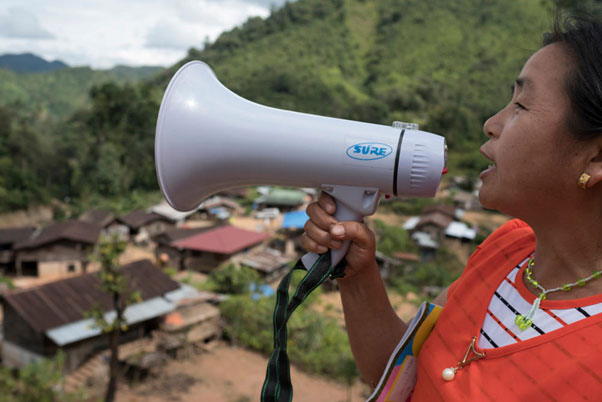In eastern Myanmar, local communities in the mountains of Southern Shan State, are using inventive approaches and early warning systems to prepare for and protect each other against the effects of extreme weather events, which are predicted to increase in the coming years.
In line with the Grand Bargain commitment to a ‘participation revolution’, the activities strengthen the links among national, subnational and local level preparedness in Myanmar. Local communities can now access information and link with the preparedness and early warning systems in the country, supporting stronger ownership of and participation in local contingency planning and frontline emergency response.
These communities received training from the Start Network’s Disasters and Emergencies Preparedness Programme (DEPP), funded by UK Aid.
'I really like to run when we do the strong wind exercises’, Louis, 6. Children perform role-plays to stay safe in the event of earthquakes or cyclones, learning when to run, duck or hide.
‘I have been teaching in this village for 21 years. It’s an area prone to strong wind and landslides so the weather training is useful for the children’. In this mountainous village where healthcare is limited, headteacher, Lay Sandar, 46, is trained to deliver essential first aid.
‘Women didn’t participate much previously (in disaster preparedness), but now we are a lot more involved if there is there any emergency, like a cyclone on the way. I am responsible for announcing it at the top of the hill,’ Joanna, 45.
‘We were not approaching typhoons with preparedness before. Everything stood to be destroyed in our fields. Now, our community receives weather information through the radio so there is less loss. We can interpret the clouds, just using our eyes’, Benedicto, 33, leader of his village’s Disaster Prevention group. Benedicto guides other locals to map out the problems they face in their area. With training, he and others now know how to prevent the destruction of their farmland.
Isaac, 18, warns his local community over the radio when extreme weather is on the way. Families can then evacuate or take cover. Young people are actively involved in helping to improve the lives of their communities in the region.
Robert now has 10,000 cardamom plants and chilli trees in his farm. Chilli and cardamom trees prevent the destruction of farmland through soil erosion and landslides. Robert dries the chillies which he sells to support his family’s healthcare and education.
In the past, children would walk long distances to collect water. People often relied on rain or dirty streams for their drinking water. But the community came together to create reserves and install pipelines, bringing fresh, clean water closer by. As a result, the number of diarrhoeal cases has dropped by 60% in the last year.
Images: Christian Aid / A Sheppey

